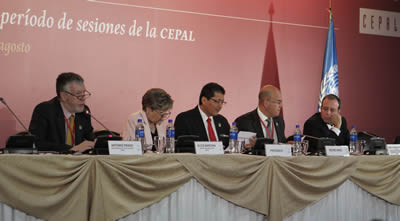ECLAC Proposes New Approach to Debate on Financing for Development
Work area(s)
The aim of the structural gap approach is to identify the main vulnerabilities and challenges faced by countries.

(29 August 2012) The Economic Commission for Latin America and the Caribbean (ECLAC) today proposed an alternative and complementary approach to the criterion of per capita income for the allocation of financing for development. The analysis involves explicitly incorporating into the cooperation agenda an evaluation of the structural gaps that are not reflected in the income per capita indicators.
The ECLAC proposal was presented by Deputy Executive Secretary, Antonio Prado, at the meeting of the South-South Cooperation Committee, which was organized as part of the thirty-fourth session being held from Monday 27 to Friday 31 August in El Salvador.
Mr. Prado explained that the structural gaps that limit country development with equality, and that are considered in this new approach, include income per capita, inequality, poverty, investment and savings, productivity, innovation, infrastructure, education, health, taxation, gender and the environment.
According to the ECLAC document Middle-income countries: A structural-gap approach, the allocation of official development assistance (ODA) based on per capita income has two main problems.
"First, overcoming inequality is both cause and effect of the development process, which is multifaceted and demands that countries close significant structural gaps that limit or hamper inclusive development processes through which it may be possible to tackle the problems of poverty and inequality", explains the publication with a prologue by ECLAC Executive Secretary, Alicia Bárcena.
"Second, the per capita income criterion presupposes that the categories of low-, medium- and high-income countries contain relatively homogenous countries in terms of their economic and social needs, which is far from being the case", adds the document.
According to this criterion, Latin America and the Caribbean is a predominantly middle-income region: only five of the region's 33 countries are not classified as middle income (with one low income and four high-income ones). This has meant the region's official development assistance has been in free fall, both relative to the region's gross national income and in comparison with other developing regions.
In the 1960s, the region received an average of almost 14% of total ODA for developing countries, while the figure now stands at around 8%. In terms of regional gross national income, the ODA received by Latin America and the Caribbean went from over 1% in the 1960s to 0.4% in the 1990s and 0.22% today. Infrastructure and social services are the sectors to have received the most ODA.
Currently, middle-income countries are home to over 70% of the world population living in poverty.
This is a very mixed group of countries in terms of poverty, inequality and productive, institutional and financial capacity.
By way of example, the per capita income of the region's countries classified as low-to-middle income varies from a minimum of 2,329 dollars and a maximum of 6,250 dollars, while the range is even wider for middle-to-high income countries, from a minimum of 6,077 dollars to a maximum of 16,407 dollars.
According to the ECLAC document "In order for the structural gaps to be used to establish criteria to guide the distribution of resources from the international cooperation system, it is essential to create new forums to discuss a global development agenda". Added to this is the need to generate innovative instruments for development financing.
ECLAC suggests broadening out the political dialogue at the national, regional and global levels.
First, the international community needs to define the general framework for an inclusive development agenda that, rather than homogenizing countries' development issues, embraces their diversity and specific characteristics. This includes broadening the multilateral dialogue on sources of resources and allocation criteria.
Second, ECLAC proposes deepening regional integration and increasing the participation of Latin America and the Caribbean in global governance, in order to generate agreements on such matters.
Lastly, countries that receive cooperation should define the gaps they wish to prioritize and use these to formulate concrete policy proposals as part of an inclusive dialogue with civil society and the private sector.
For exclusive interviews and queries, please contact María Amparo Lasso, Head of the ECLAC Public Information and Web Services Section. E-mail: prensa@cepal.org - mariaamparo.lasso@cepal.org; Mobile: (56 9) 79678306 - Office: (56 2) 2102040; Daniela Estrada. E-mail: daniela.estrada@cepal.org; Mobile: (56 9) 81993349; or María Luisa Díaz.
E-mail: marialuisa.diaz@cepal.org; Mobile: (56 9) 66079429.
Follow us on: Twitter, Facebook, Flickr and YouTube.
Country(ies)
- Latin America and the Caribbean
Contact
Public Information Unit
- prensa@cepal.org
- (56 2) 2210 2040
